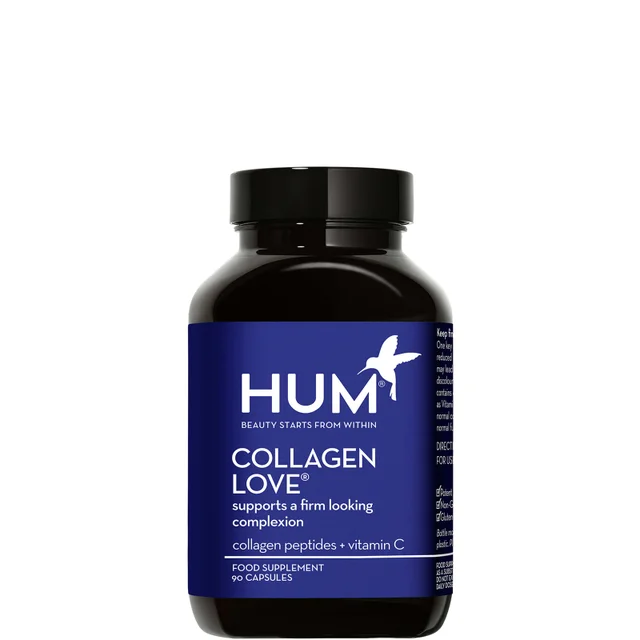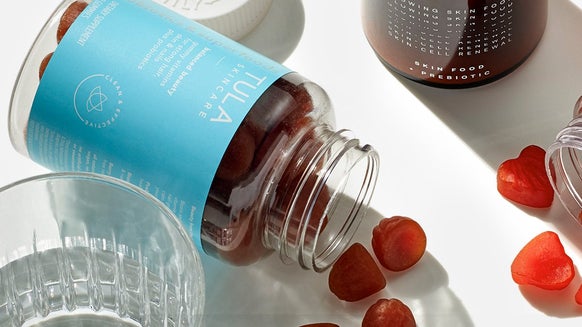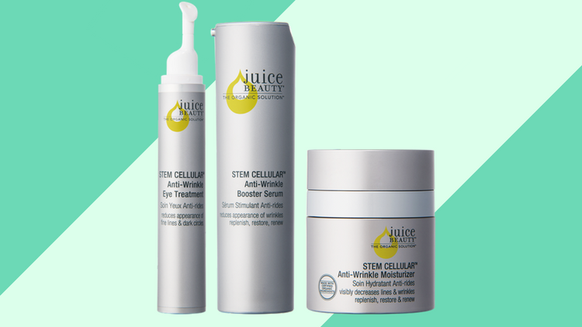The Definitive Guide to Understanding Collagen Supplements
Ingestible beauty is no longer a trend: It’s here to stay. The link between diet and skin has long been respected, but these days, we’re interested not only in eating well, but in supplementing our diets with even more. With the proliferation and popularity of these supplement products, all the details about how, when and why to use everything is so confusing, you might just go cross-eyed. Just try googling “collagen supplements,” or worse, “best collagen supplements” and you may run for the hills in confusion.
From collagen drinks to powder and capsules, there’s a sea of options to choose from. All of them claim to boost your skin’s natural anti-aging abilities, with some promising to support all-around beauty, prevent joint pain and build muscle or protein.
We all know we want collagen (because it’s disappearing at a rapid pace as we age), but how do we know these supplements work? How do you buy them? How do you read these labels? What do you need to know?
A Deep Dive Into Collagen
Collagen starts to break down in early adulthood, and then the quest to replace it begins. But the collagen we put on our faces and the collagen we consume is not human; it’s usually from animals, and most often from fish. People have shown an aversion to using cow, pig or chicken-derived collagen, so you may often see a clarification on labels that the collagen is 'marine,' or fish-derived.
Technically, there are 28 types of collagen (defined and researched so far), but of the five most common, only three are used for topical or ingestible beauty products: types I, II and III (creative names, right?). This article by Stephen Daniels, “The Science of Nutricosmetics,” helps to clarify the types a bit: Type II is formed in cartilage (usually chicken) and types I and III are formed in skin, tendon, scales and bones of all the above-mentioned animals.
Whatever the type, collagen is either kept in the whole protein form (unhydrolyzed)—which is, according to most studies, too large to be absorbed through the skin—or hydrolyzed, which means, loosely, the proteins are chopped up into smaller pieces. For that reason, most topical and ingestible collagens are hydrolyzed: They’re supposedly more easily digested and absorbed in this smaller form.
The Collagen Debate
Not everyone agrees that collagen, whether or not it’s hydrolyzed, can be assimilated usefully into the body through the digestive system. According to some experts, the collagen you’re drinking or eating doesn’t just magically reappear as collagen in your skin—it’s broken down and used in other ways. Cosmetic dermatologist Dr. Robert Anolik explains it this way: “If we consume any protein, collagen or otherwise, the majority of it is digested into amino acids immediately, making whatever we intake irrelevant. In fact, much of our protein digestion starts in the stomach, where the acidic environment favors protein denaturation [breakdown].”
Joyce Longfield, a molecular biologist specializing in food science, says this: “It’s not like eating an orange and taking in vitamin C that our body will utilize in any way it can get it. Collagen is a protein, not a vitamin, so this is metabolically utilized differently and I think this is the missing piece a lot of consumers don’t understand.”
To put it plainly, you’re eating a bunch of expensive collagen proteins and it’s being acid-washed in your stomach and broken down into tiny pieces that may or may not be doing any good whatsoever.
So: should you pour everything down the drain and flush everything else down the toilet? Is there a positive tilt to this?
Current Research & Understanding Dosage
Actually, there are several current studies favoring collagen as a useful supplement, but understanding the dosage and alternate factors involved is also important.
Zak Normandin, CEO of Dirty Lemon, shared this 2013 study with us, which shows that after eight weeks with a dosage of hydrolyzed collagen as low as 2.5g daily, positive changes are seen in women 35-55 years old. Elasticity, in particular, was measurably improved (in the older women, not in the younger women). Skin moisture improved, but not to a statistically reportable degree.
This recent clinical trial, on the other hand, gave groups of women aged 40-65 in France and Japan an increased dose—10g—of hydrolyzed marine collagen daily for eight weeks. Results were positive, and included not only improved elasticity, but a higher statistically reportable moisture content.
So if you do believe in collagen supplements, you need to pay close attention to the dosage. That’s key. “With type I & III collagen, you really need to consume >6g at a time to be effective,” says Joyce Longfield.
Experts Respond to Recent Studies
In response to the above referenced studies, experts asked: yes, we see collagen going in, but is it the collagen making the difference? How closely were participants’ diets controlled? What was their water and alcohol intake like?
Corina Crysler, nutritionist and co-founder of GliSODin Skin Nutrients, told us, “Elasticity would be the main objective when taking a collagen supplement. Hydration could come from many other things, even the time of year. I feel more data is needed, as there is a lot of clinical work that suggests it doesn’t work due to the structure of collagen and its bio-availability.” GliSODin Skin Nutrients anti-aging supplement focuses in hyaluronic acid, omega-3s and other boosting supplements, rather than actual collagen.
Says Dr. Anolik, “I find it interesting that studies are being done to explore the possibility of collagen supplements enhancing skin. Of course I am open to anything that helps our skin, but because I am a doctor basing my skin care on science and evidence, I want more evidence than I’ve seen so far.”
This seems to be the clincher for Dr. Anolik: “I’d be more influenced if a study could in some way tag or label the supplement consumed and have that tag be found in large concentrations in the new skin.”
Coming from the perspective of someone who uses collagen to build healthy muscle, Joyce Longfield notes, “Metabolism studies show that the average person requires 8g of protein for the anabolic process of protein synthesis to begin in our bodies. This information is from journals specific to exercise and muscle growth, so it is possible too that as little as 2.5g could improve skin, hair and nails but then just not improve muscle development.”
Following this line of thinking, Longfield also notes that it would matter how soon after taking collagen the participants ate food or drank water, as this can impact the digestion of the collagen protein.
The Bottom Line: Focus on Collagen Building Blocks
Given all the uncertainty around collagen supplement effectiveness, many experts say that the best way to build more collagen and protect what you already have is two-fold: Use sunscreen of course (because UV rays break down collagen) and eat well while focusing on the collagen building blocks, not collagen itself. And if you want to take supplements, focus on taking collagen-building supplements, not just on collagen protein.
Of course, none of this will work without a good diet: “When we have reasonable nutrition,” explains Dr. Anolik, “our bodies already have the building blocks for collagen in our skin, namely the required amino acids (these are the building blocks for proteins, which is what collagen is).”
If you’re looking for an additional boost—beyond the old-fashioned sunscreen and apple-a-day-method—there are ways to boost collagen production without actually eating collagen. Most of the experts agree, concentrating on eating the building blocks of collagen so your body has the tools it needs to preserve the collagen it has and produce more is the best way to go.
Oates points out that inflammation is a major cause of skin deterioration and collagen breakdown. She recommends the usual heavy hitters, including dark green leafy veggies, berries and pomegranate—which are also packed with vitamin C—to combat inflammation.
“Both hyaluronic acid and zinc are good additional supplements to further improve collagen production and overall cell function,” agrees Longfield.

From the latest hair and makeup trends to the best solutions for your skin issues, we've got all your beauty concerns covered!









